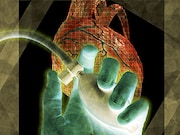At six months, patients who underwent renal denervation used less medication to control BP
FRIDAY, March 22, 2019 (HealthDay News) — The benefits of reduced blood pressure (BP) following renal denervation (RDN) surgery are maintained for at least six months, according to a study published online March 17 in Circulation to coincide with the annual meeting of the American College of Cardiology, held from March 16 to 18 in New Orleans.
Michel Azizi, M.D., Ph.D., from Université Paris-Descartes, and colleagues report six-month results of the RADIANCE-HTN SOLO trial following the addition of a recommended standardized stepped-care antihypertensive treatment (SSAHT) to the randomized endovascular procedure versus sham procedure for patients with monthly measured home BP of ≥135/85 mm Hg. SSAHT consisted of the sequential addition of amlodipine 5 mg/day, a standard dose of an angiotensin converting enzyme inhibitor/angiotensin receptor blocker, and hydrochlorothiazide 12.5 mg/day, followed by the sequential uptitration of hydrochlorothiazide (25 mg/day) and amlodipine (10 mg/day).
Based on a total of 69 of 74 RDN patients and 71 of 72 sham patients who completed the six-month ambulatory BP measurement, the researchers found that at six months, 65.2 percent of patients in the RDN group were treated with the SSAHT versus 84.5 percent in the sham group. Similarly, the average number of antihypertensive medications (0.9 versus 1.3) and defined daily dose (1.4 versus 2.0) were lower in the RDN group versus the sham group. RDN reduced daytime ambulatory systolic BP to a greater extent compared with sham, despite less intensive SSAHT (−18.1 versus −15.6 mm Hg; difference adjusted for baseline BP and number of medications: −4.3 mm Hg). No major adverse events were reported in either group through six months.
“We showed that in patients with combined systolic and diastolic hypertension, though the majority of patients needed the addition of the SSAHT in order to improve BP control, fewer medications were administered in the RDN group, and the BP lowering effect of endovascular ultrasound RDN was maintained at six months without adverse safety signals,” the authors write.
Several authors disclosed financial ties to pharmaceutical and medical device companies, including ReCor Medical, which funded the study and manufactures the renal denervation system used in the study.
Copyright © 2019 HealthDay. All rights reserved.








